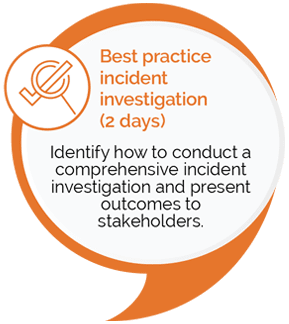To offer accredited training, it is required by law to be registered and regulated by the Australian Skills Quality Authority (ASQA). Learning Dimensions Network (LDN) is a Registered Training Organisation (RTO 122052) and received its registration in 2007.
LDN focus on designing relevant and high-quality training for industry organisations and workers. We hold the same permission to deliver accredited training as a TAFE.
Industry, public and private training providers and state and federal governments work together to ensure that vocational education and accredited training is consistent across the country and relevant to Australian workplaces.
Accredited training is any program leading to vocational qualifications and credentials recognised throughout Australia. It ensures quality training that develops participant’s skills and knowledge to support employment opportunities or allows participants to continue further education and lifelong learning.
LDN has enrolled more than 22,000 people in our RTO since we began delivering accredited training and 99.85% of participants work in organisations who wish to increase skill capacity of their workforce.
LDN recognise that often participants require specific skill sets contained within a qualification, rather than a full qualification.
Given this, we have designed our qualifications into two-day modules. Complete one module and receive a statement of attainment in the associated units of competency. Complete all modules and receive the full qualification.
Want to know more? To transform your workforce with accredited training call LDN on 03 9510 0477 or contact us below to explore flexible, industry-aligned training programs designed to meet your organisation’s needs. Let’s get started!
Want to learn more about how education standards, qualifications, and the Australian Qualifications Framework (AQF) work?
OUR ACCREDITED COURSES
BSB41419 Certificate IV in Work Health & Safety
The BSB41419 Certificate IV in Work Health and Safety qualification is for those interested or responsible for safety in the workplace. Learn to manage risks, apply relevant WHS laws and contribute to keeping everyone free from harm.
Join one of our public program through our Workplace Dimensions division or speak to us about customising a program for your workplace.
MODULES IN THIS PROGRAM
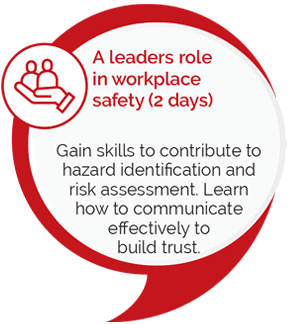 Module outline
Module outline
Within this module, workplace leaders gain the skills to contribute to hazard identification and risk assessments and learn how to communicate as a workplace leader to build trust. This module explores the skills and knowledge required to contribute to WHS risk management including the processes for identifying work health and safety (WHS) hazards and assessing and controlling the risks relating to those identified hazards according to legislative and organisational requirements.
Participants will gain the skills and knowledge required to understand different communication contexts, how to choose methods of communication to suit the audience and the importance of follow-up.
Units covered in this module:
- BSBLDR412 – Communicate effectively as a workplace leader
- BSBWHS414 – Contribute to WHS risk management
Outcomes
At the end of this module participants will be able to:
- discover the role and importance of communication and consultation in minimising harm at work including accessing information and data used to identify hazards and to assess and control risks and how to clarify messages and create engaging and effective communication;
- define the purpose and need for follow-up actions for different communications;
- identify accurate communication context and contribute to identifying risk management requirements and compliance; and contribute to workplace hazard identification and risk assessment
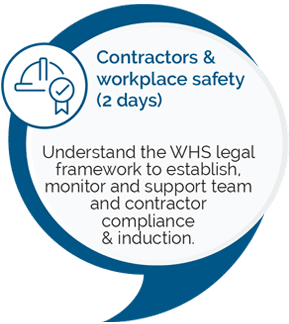
This two-day module supported by workplace application and assessment delivers two units towards the BSB41419 Certificate IV in Work Health and Safety.
Module outline
Whether you are a contractor, or you work with contractors, the law is very clear about WHS obligations on both sides.
This module develops the required skills and knowledge to assist with establishing and maintaining workplace compliance with work health and safety (WHS) laws. This includes identifying applicable WHS laws, duties, rights and obligations, and the necessary actions to ensure WHS compliance in the workplace, assisting with providing advice about the legislative duties, rights and obligationsof individuals and parties prescribed in WHS laws and those of WHS regulators.
Participants will also develop an understanding of requirements to assist in managing the work health and safety (WHS) implications of using contractors. It involves identifying contractor duties, establishing organisational WHS compliance requirements associated with those duties, establishing and communicating the requirements expected of contractors, monitoring contractor compliance with WHS requirements, and implementing required responses to identified non-compliance.
Units covered in this module:
- BSBWHS412 – Assist with workplace compliance with WHS laws
- BSBWHS418 – Assist with managing WHS compliance of contractors
Outcomes
At the end of this module participants will be able to:
- identify the legal framework for WHS in the workplace;
- provide advice about WHS compliance;
- establish WHS legislative compliance;
- maintain WHS legislative compliance;
- prepare for, and assist with, contractor WHS induction processes; and
- monitor contractor WHS compliance requirements and address non-compliance.
This two-day module supported by workplace application and assessment delivers three units towards the BSB41419 Certificate IV in Work Health and Safety.
Module outline
This module provides participants with the skills and knowledge to contribute to the implementation and maintenance of WHS consultation and participation processes and monitoring WHS systems, policies, procedures and programs.
It enables participants to meet due diligence obligations by gaining an understanding of what is required in terms of due diligence in the Australian workplace and how to meet their legal obligations in respect of their role and organisational requirements.
Units covered in this module:
- BSBWHS415: Contribute to implementing WHS management systems
- BSBWHS413: Contribute to implementation and maintenance of WHS consultation and participation processes
- BSBWHS419 Contribute to implementing WHS monitoring processes.
Outcomes
At the end of this module participants will be able to:
• contribute to developing, implementing and evaluating a work health and safety implementation plan;
• identify your (and others) roles and responsibilities in relation to WHS consultation and participation, then implement, review and make improvements as required;
• contribute to communicating and sharing WHS information and data;
• consult with relevant individuals to identify conditions to be measured;
• contribute to selecting measuring equipment; and
• collect information about the requirements of monitoring and contribute to testing.
This two-day module supported by workplace application and assessment, delivers three units towards the BSB41419 Certificate IV in Work Health and Safety.
Module outline
In this module participants gain an understanding of what is involved in incident response and investigation in order to prevent further harm. Participants explore, should an accident or incident occur, how to identify and conduct a comprehensive incident investigation in line with legislative and organisational requirements and how to collect, organise and analyse information using available systems and prepare, deliver and review presentations for target audiences.
Units covered in this module:
- BSBWHS416 – Contribute to workplace incident response
- BSBINS401 – Analyse and present research information
- BSBCMM411 – Make presentations
Outcomes
At the end of this module participants will be able to:
- understand what is involved in incident response and incident investigation;
- identify how to conduct a comprehensive incident investigation inclusive of research, analysis and recommendations;
- understand how to collect, organise and analyse information using available systems;
- practice incident investigation and presentation skills to enhance understanding and skill levels; and
- explore what makes an engaging and effective presentation.
BSB40520 Certificate IV in Leadership & Management
Participants in this program learn how to provide leadership and guidance to others in the workplace and to manage effective, motivated, high performing teams in all types of organisations and industries.
BSB40520 Certificate IV in Leadership and Management is a foundation program focusing on the skills required to lead and manage people and teams. This program provides leaders with skills, tools and knowledge and transforms them into leaders of others.
The program supports frontline leaders to extend their skills in leading, influencing and engaging work teams. Throughout the program participants are provided opportunities to be self-reflective and to drive their own development and performance.
Join one of our public program through our Workplace Dimensions division or speak to us about customising a program for your workplace.
MODULES IN THIS PROGRAM
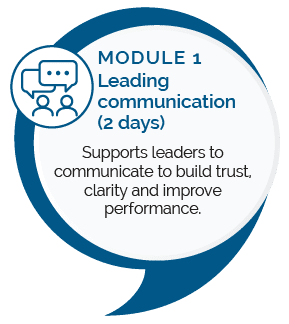 This two-day module supported by workplace application and assessment delivers three units toward BSB40520 Certificate IV in Leadership and Management.
This two-day module supported by workplace application and assessment delivers three units toward BSB40520 Certificate IV in Leadership and Management.
Good communications have long been positioned as one of the fundamental skills of strong leaders. Quality interpersonal skills have been proven to build trust and robust relationships that underpin the development of teams and increase the influence of an individual both internally and externally. This two-day program addresses these skills not as a ‘nice to have’ but rather as fundamental to the achievement of improved results through interactions with others. Increased productivity, delivery of efficiencies and reduced rework due to miscommunication are only some of the deliverables that this module seeks to achieve.
Participants attending this module will build the ability to flex to the way they communicate to the preferred communication styles of others. This is achieved through gaining deeper listening skills and more informed ‘reaction management’. Whether with direct reports, clients or peers, participants will learn how to give effective feedback, constructively engage in conflict by listening to different perspectives and seeking to deal with others respectfully and confidently.
Units covered in this module:
- BSBXCM401 – Apply communication strategies in the workplace
- BSBCMM412 – Lead difficult conversations
- BSBLDR412 – Communicate effectively as a workplace leader
At the end of this module participants will be able to:
- Evaluate appropriate methods of communication, identify barriers to effective communication and engage others in ideas generation
- Ask quality questions and listen more deeply for increased understanding of core issues and motivations
- Develop trust and confidence in others through quality interactions that deliver the agreed outcomes
- Run presentations and meetings that engage others, create two-way conversations that result in action
- Give effective feedback for performance improvement
- Self-manage difficult conversations for more effective outcomes
- Manage difficulties in the workplace and work performance to create positive outcomes
- Engage in effective record keeping and reporting on communication outcomes
- Maintain networks and sustain quality relationships with teams, peers and clients, monitoring satisfaction levels and addressing issues proactively.
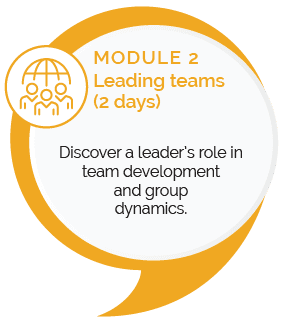 This two-day module supported by workplace application and assessment delivers four units toward BSB40520 Certificate IV in Leadership and Management.
This two-day module supported by workplace application and assessment delivers four units toward BSB40520 Certificate IV in Leadership and Management.
Leaders who can harness a team environment that is inclusive, where individuals know how they add value to the broader business and who are clear about expectations on their performance will achieve results far beyond those that do not. Team leadership requires an understanding of what individuals and the group need in different situations in order to feel confident, competent and to continue to build skills with the evolving workplace.
Designed both for managers of intact teams, project teams and for team members working in a matrixed organisation, this module outlines the key stages of team development and how to move the team from early relationship development through to an aligned focuses on goals and collaborative work flow. This two-day program also focuses on planning and prioritisation in order to create efficiencies, reduce rework and optimise individual performance.
Units covered in this module:
- BSBLDR411 – Demonstrate leadership in the workplace
- BSBLDR414 – Lead team effectiveness
- BSBXTW401 –Lead and facilitate a team
- BSBLDR413 – Lead effective workplace relationships
At the end of this module participants will be able to:
- Better appreciate where to focus their energy in order to increase influence and reduce lost time on things beyond their control
- Plan, prioritise and evaluate resources in order to create efficiencies and optimise performance
- Identify opportunities to delegate tasks to support individual skills development and in-role growth
- Recognise behaviours that occur at each stage of team development
- Intervene appropriately to lead individuals through the stages of team development (either as a manager or team member)
- Review their current team against the characteristics of a high performing team and develop strategies to progress toward this
- Build a vision and compelling reason to motivate team members and subcontractors to work together toward optimal performance
- Set goals to support a growth mindset and opportunities for development
- Create action plans that can be implemented with current teams
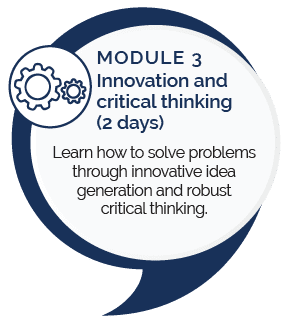
This two-day module supported by workplace application and assessment delivers three units toward BSB40520 Certificate IV in Leadership and Management.
Leaders are required to think quickly, innovate and make decisions in a fast-paced environment. Participants discover how to adapt their leadership style, to successfully solve the many problems leaders face on a day-to-day basis, to deliver on robust outcomes in complex work environments while juggling conflicting priorities. Participants will learn how to apply critical thinking to innovate and continuously improve, while confidently understanding how to manage projects and plans in an ever-changing environment.
Units covered in this module:
- BSBOPS402: Coordinate business operational plans
- BSBPMG430: Undertake project work
- BSBCRT411: Apply critical thinking to work practices
At the end of the module participants will:
- Learn how to solve problems with innovative thinking
- Explore how to manage contingencies that arise when implementing something new
- Understand the difference, and need for, critical and creative thinking in the innovation process
- Learn how to manage stakeholders in the innovation processes
- Discover how to increase productivity through co-ordinating business operational plans
- Discover how to evaluate and test ideas as solutions to problems
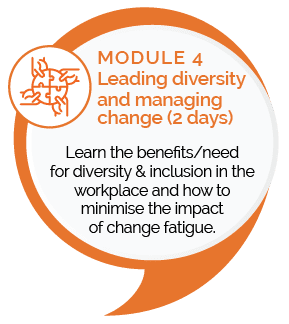 This two-day module supported by workplace application and assessment, delivers two units toward BSB40520 Certificate IV in Leadership and Management.
This two-day module supported by workplace application and assessment, delivers two units toward BSB40520 Certificate IV in Leadership and Management.
Units covered in this module:
- BSBLDR521– Lead the development of diverse workforces
- BSBTWK503 – Manage meetings
Day 1 – Leading diversity
Day 1 will centre on diversity and inclusion. There will be discussions on diversity of thought, actions, beliefs, and practice. Learn how promoting an inclusive workplace can support your team’s growth and productivity. Designed to uncover conscious and unconscious barriers to accepting of difference, you will leave with a new understanding and awareness of this topic.
During this module participants will:
- Build personal relevance around what diversity and inclusion means
- Understand the personal and business benefits of diversity and inclusion
- Determine the internal and external barriers that prevent inclusion in the workplace and learn what to do when the barrier presents itself
- Learn how to embed diversity into plans and day to day operations; and
- Discover how to support the development of a diverse and inclusive workforce
- Identify your own beliefs and attitudes in relation to diversity and inclusion in various areas
DAY 2 – Managing change
Day 2 will centre around change as a constant. Change of priorities, team members, deadlines, skills, briefs, boundaries, leadership, and job roles. In this one-day program understand how to manage change within yourself and your team, and importantly how to manage constant change and the corresponding change fatigue. Discover how to communicate change that empowers productivity not polarises action
During this module participants will:
- Understand how change affects performance and a Leader’s role in this journey
- Recognise the signs of change fatigue, what causes it and potentially what could tip people over the edge
- Discover what people need most during change and what a Leader can do to help their team manage change fatigue and uncertainty (including the impact on people’s reactions and emotions) and create a climate of certainty in the face of shifting priorities.
11045NAT Certificate IV in Safety Leadership
This course is designed to provide managers and current and future Leaders (including those in safety-critical roles) with the skills and knowledge to develop sustainable safety cultures that lead to safer workplaces.
The course focuses on aligning individual and organisational safety values, beliefs, and behaviours. In turn, this enables robust and dynamic WHS systems and processes to support and enhance behavioural compliance, rather than relying on the system alone and regulatory requirements.
Based on over ten years of industry, government and higher education research and application of safety leadership competencies, this course is grounded in a practical understanding of all workplaces including high-risk industries.
Express your interest in a public program through our Workplace Dimensions division or speak to us about customising a program for your workplace.

